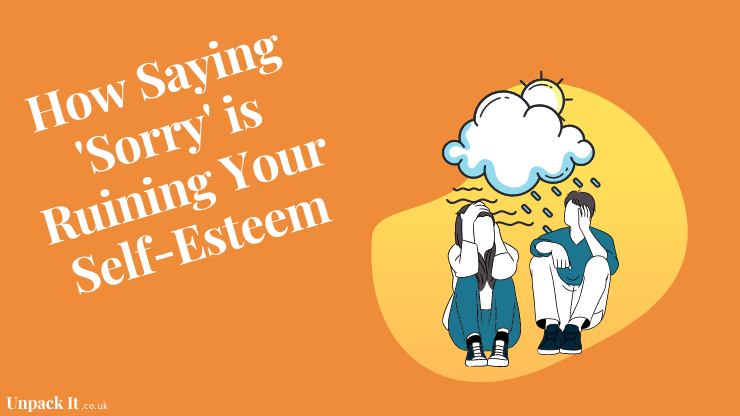What would your first impression be of someone who constantly says sorry?
I bet ‘confident’ and ‘self-assured’ was not what you were thinking. As a young adult, I notice myself and my peers say sorry all the time. Most of the time it’s unnecessary and ruining our self-esteem.
I searched my WhatsApp conversations to see how often people said ‘sorry’ and the results were overflowing.
Here are some examples:
- ‘Sorry, just thought I’d share that video for pure comic reasons’
- ‘oh sorry. I thought you said something else lol’
- ‘sorry I had to sleep, I was feeling so tired ahahah’
- ‘sorry guys, I’m going to miss out on tonight’
- ‘hahaha sorry that video is so funny’
- ‘sorry for asking a lot of questions’
- ‘sorry just finishing dinner’
- ‘sorry’ ‘so sorry’ ‘omg sorry’ ‘sorry but’
Bruh… just by reading all those messages my energy levels have dropped! So imagine how we’re making ourselves feel when we constantly type it, and even worse, say it aloud. Words have a huge impact on how we carry ourselves, how we feel and on our energy levels. By saying ‘I’m sorry’ all the time, we make the word define our identity. Do we want to be known as ‘pitiful and regretful’ or ‘confident and happy’?
There are many reasons behind our ideas as to what or who is worth apologising for. It can be because of how we think of ourselves; our upbringing; our culture; and even our gender. Some might apologise for not being as polite as their social norms suggest and research suggests men apologise less frequently than women. But aside from these generalisations, anyone can turn apologising into an automatic response, and it can lead to some negative affects on ourselves. Therefore in this article we’ll unpack how to spot our ‘sorry’ patterns and what to do to change this habit.
Over apologising not only undermines your confidence, it also lowers your self-esteem.
Although there is nothing wrong with saying sorry and acknowledging our mistakes, over apologising can show a lack of self-confidence and that we might be tackling some anxiety. If you ever feel worse after apologising frequently in a conversation, it’s because you’re giving your confidence away with every unnecessary sorry.
The reason behind why we over-apologise might be more deep rooted than we think, and it’s a good idea to reflect on the causes of it. Commonly, the reason is stemmed from regular occurrences in the past where we felt criticised and judged. Particularly by those closest to us. This feeling of negative judgement slowly impacts our perception of ourselves. We start to think our voice isn’t valued, so we apologise for anything because we’re worried of people’s response.
If it gets out of hand, it can stop us from being who we truly are because the judgement that might come with it is triggering undealt feelings. It’s a viscous cycle. Most of our childhood traumas (no matter how big or small) aren’t dealt with once we’ve grown up, yet they continuously affect our mindset and perceptions because we neglect ourselves from healing old wounds.
Spot the Pattern
Look back at the examples I gave at the beginning. What are the reason for the apologies? Eating, sleeping, being curious, and even for laughing. We’re apologising for our essential needs, for being human and basically for existing. Is it just a subconscious habit or do we actually regard ourselves so lowly?
We tend to apologise to deflect attention from ourselves if we’ve messed up in some way or if we think we’ve done wrong by someone. But the habit of this social nicety is often counteractive. Leading or ending sentences with a negative, points out flaws and mistakes that wouldn’t have otherwise been noticed. Plus, it can lose people’s respect, interest, or attention towards you (particularly in the workplace).
Say Thank You
We can change our response by using other words or phrases such as ‘thank you for pointing that out’, ‘sure’ ‘right’ or don’t say anything.
Replacing ‘sorry’ with ‘thank you’ is a powerful way to get out of the habit of over apologising. Instead of apologising for a minor mistake which lowers our significance, ‘thank you’ will acknowledge someone else for pointing out a mistake, thus praising them for doing something right. By thanking someone, we make it clear that we notice our mistake and are grateful to them for pointing it out.
Thank you moves the focus from you to them. For example, if you are late to a meeting, instead of saying ‘sorry, I’m late’ say: ‘Thank you for waiting. I appreciate your patience’. They were nice enough to wait for you so you should acknowledge that.
Apologies can be meaningful. If we overuse them, we decrease the value of their authenticity and people may not believe we’re being genuine.
Suggestions
It’s hard to stop a habit, especially one we don’t notice. However we can start by being more conscious with the words we use. Check out James Clear’s article on How to Break a Bad Habit and Replace it with a Good One.
When you catch yourself apologising unnecessarily, ask yourself: was there a need to apologise? Did I upset anyone from what I said or did? Has it made myself feel better or less confident?
How to replace ‘sorry’ in certain scenarios:

Share post



